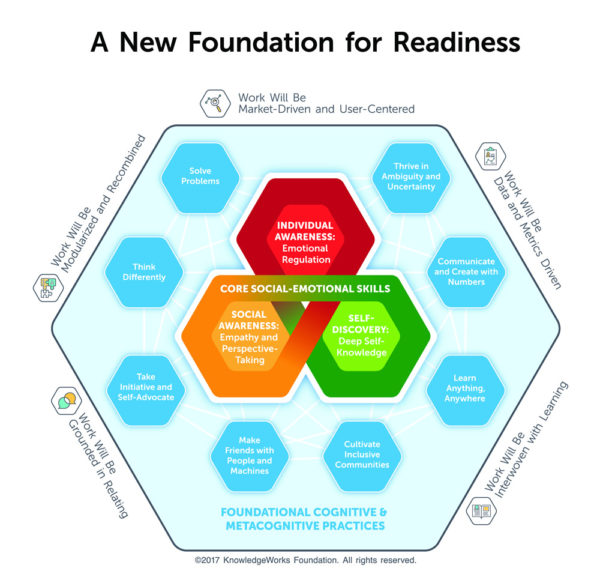Today’s working adults have seen a lot of change in the employment landscape. But that change is likely to be modest compared to the changes coming between now and 2040. We stand at the beginning of a new era driven by exponential advances in digital technologies. As that era unfolds, people will increasingly work alongside machine partners to navigate, make sense of, and contribute to the world around us. In addition, the structures within which we work are likely to change significantly.
Our machine partners will become more and more capable of cognition. As smart machines develop further and get cheaper, they will be able to perform increasingly sophisticated and varied tasks. Their presence in the workplace will alter or eliminate many tasks that people carry out today, including tasks associated with knowledge-based work, creative work, and care-based professions. A key question is the extent to which smart machines will displace human workers faster than new jobs can be created or old ones reconfigured.
Technology is also changing the structure of work, due in large part to the lower coordination costs afforded by the Internet and the access to an expanded labor pool resulting from globalization. Such shifts are contributing to shortening employment tenure, the spread of contingent and project-based work, and the rise of taskification, or the breaking down of formal jobs into discrete tasks, often at relatively low wages and with informal job structures. Depending on what kinds of societal supports we put in place, people could increasingly bear responsibility not just for managing participation in the employment landscape, but also for getting ready for it.
What will future work look like?
Taken together, the rise of smart machines and the decline of the full-time employee can be expected to cause rapid change, making it necessary for people to reskill and upskill over and over again throughout our lifetimes. As we do so, our uniquely human attributes—such as connecting with others, solving complex problems, and generating creative ideas and outputs—will be increasingly central to our workplace contributions. Future work is likely to depend on the qualities that make us uniquely human, as compared to repeatable or pattern-based tasks that can be automated with relative ease.
Given that need, education at all levels needs to extend its focus beyond content mastery, skill development, and application to put social-emotional skill development at the center of a new foundation for readiness that redefines readiness for the emerging era.

At the core of this new foundation for readiness:
- Deep self-knowledge will help people develop visions for our lives and continue to discover their own personal and professional strengths, weaknesses, passions, and emotional patterns.
- Individual awareness will help people recognize and regulate our emotions; understand the triggers that spark them; and shift to more desired, productive emotional states when needed.
- Social awareness will help people recognize others’ emotions and perspectives, enabling us to build relationships in support of learning, collaboration, and innovation and foster inclusive work environments.
Layered atop those core social-emotional skills, practices such as cultivating inclusive communities and communicating and creating with numbers promise to help people contribute to the new world of work that is beginning to emerge today.
What readiness can look like in K-12
For the most part, today’s schools and districts are not equipped to respond fully to the charge of redefining readiness. It can seem easier (and more urgent) to focus on shorter-term goals such as ensuring college readiness, establishing career-related pathways on today’s terms, infusing more STEAM coursework in the curriculum, or raising test scores. While such goals are important, they will not suffice to meet the challenges on the horizon.
Educators who grapple with the need to redefine readiness typically emphasize the need for more personalized, authentic, relationship-based, real-world, flexible, and student-driven learning. More specifically, redefining readiness in K-12 learning environments could mean that:
- Students are grouped in new ways to follow flexible learning pathways
- Classrooms become more fluid and open, enabling new ways of structuring learning
- School schedules are transformed to allow for more interdisciplinary collaboration, deep reflection, and personalized learning
- Curriculum is inverted, with core social-emotional competencies shaping how inquiry projects are designed and what school and classroom rituals anchor learning climates and cultures
- Educators redefine their roles to focus less on content or grade specialization and more on foundational skills and practices
- Community partners become key assets for introducing new kinds of learning experiences that stretch students’ comfort zones and expand their aspirations.
Beyond this list, redefining readiness could mean additional or different things in your region, for your district, or for the learners whom you support. More important than any specific parameters for future-ready learning experiences is engaging in exploratory conversations about how you and current or future partners might respond to the changing environment.
Exploring the changes on the horizon together, identifying opportunities and challenges, articulating a shared vision, and committing to initial strategies or areas for further learning promise to help K-12 learning environments lead the charge in shaping the future of readiness. Educators and other readiness stakeholders need to start planning today to help all learners be ready to thrive in 2040.
For ideas on facilitating such conversations in your community, see KnowledgeWorks’ “Shaping the Future of Readiness: A Discussion and Facilitation Guide.”
[Editor’s Note: Future posts by KnowledgeWorks’ Jason Swanson will highlight the potential to leverage augmented reality, virtual reality, and wearables to create responsive learning environments that can help cultivate many of the social-emotional skills mentioned in this post. Another article will explore questions related to learner agency that stakeholders will need to explore as artificial intelligence moves deeper into education.]
- 4 ways to encourage play in education - April 25, 2024
- It’s time to pay student teachers - April 25, 2024
- The evolving requirements of a K-12 school network - April 24, 2024

